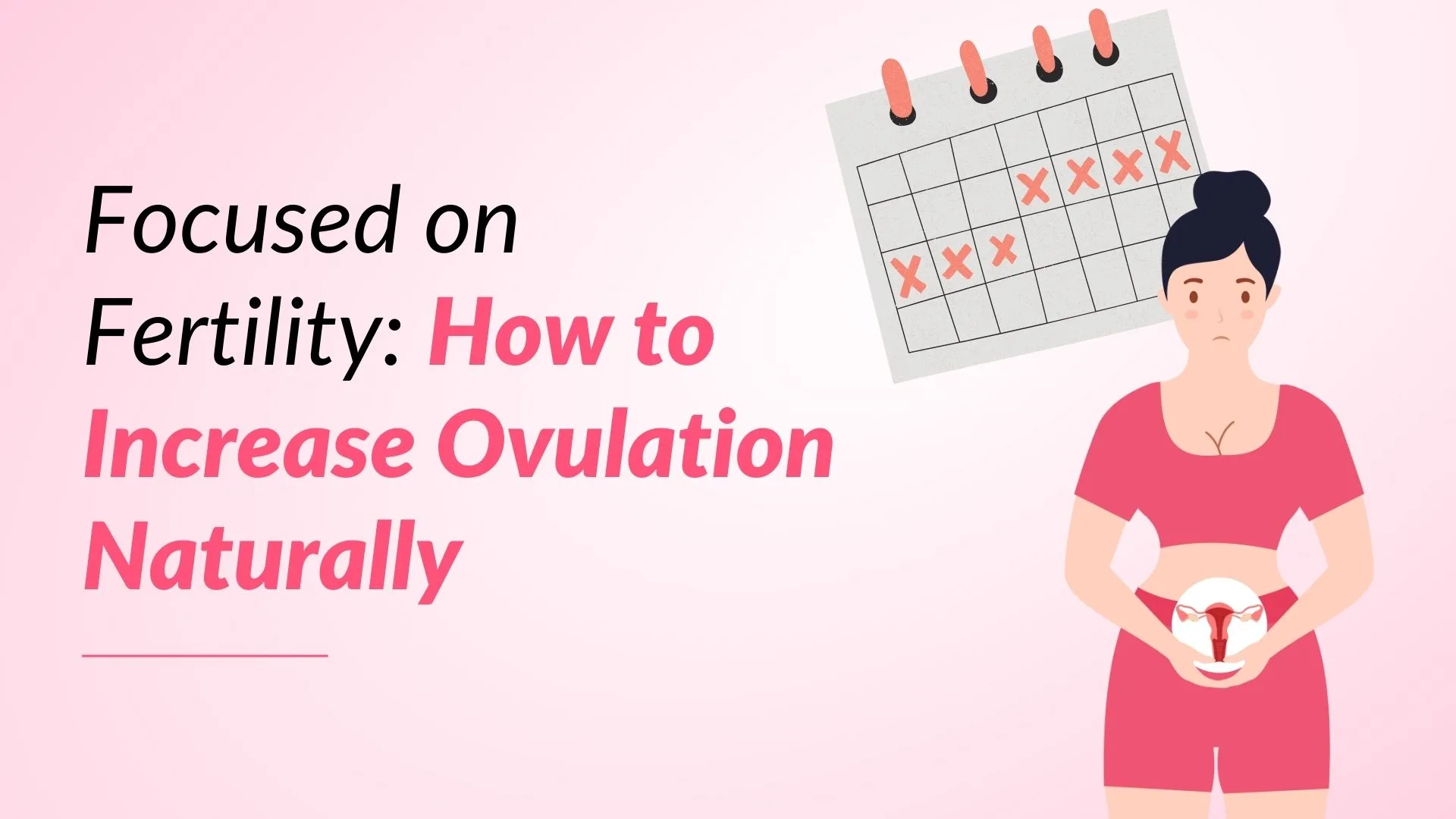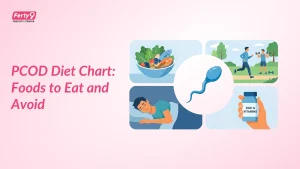Starting a family is a dream for most couples, but many struggle with fertility issues. Fortunately, there are a lot of natural approaches to improving your fertility, including specific dietary and lifestyle choices. In recent times, many women have looked for advice on how to boost ovulation naturally through lifestyle changes such as appropriate nutrition, exercise, and stress management. Understanding your body’s rhythm and implementing some easy lifestyle modifications can increase your chances of having a successful pregnancy journey.
Understanding Ovulation and Its Importance in Fertility
Ovulation is the release of an egg from the ovary during a woman’s monthly cycle. It is an important element of fertility since it determines when a woman is most likely to become pregnant. The usual menstrual cycle lasts 28–35 days. Ovulation typically occurs between days 11 – 21 of your cycle. Luteinizing hormone (LH) levels rise, signaling the release of the most mature egg. At the same time, your cervical mucus becomes more slippery, allowing sperm to find their way to the egg. One of the two fallopian tubes that connect your ovaries to your uterus is where the egg travels. On its way to the uterus, sperm may fertilize it if the time is appropriate. The egg dissolves if fertilization does not occur within 24 hours of the egg releasing from the ovary. Understanding how to rupture an follicle naturally often involves supporting ovulation through a balanced diet, regular exercise, stress reduction, and ensuring optimal hormonal health.
Understanding ovulation and its timing is critical for anyone attempting to conceive because it creates a clear window of opportunity for conception to occur. Researching how to boost ovulation naturally often leads to recommendations like consuming fertility-boosting foods, taking essential vitamins, and practicing mindfulness techniques.
Also Read: Symptoms of Blocked Fallopian Tubes
Common Causes of Ovulation Problems
Ovulation difficulties are a common cause of infertility. Ovulation issues can be caused by:
- Polycystic Ovarian Syndrome (PCOS)
- Thyroid issues: Both hyperactive and underactive thyroid glands might inhibit ovulation.
- Premature ovarian failure is when the ovaries stop functioning before the age of 40
- Hyperprolactinemia
- Hypothalamic dysfunction
- Primary ovarian insufficiency (POI)
Other causes include :
- Scarring from surgery
- Cervical mucus problems
- Fibroids
- Endometriosis
- Pelvic inflammatory disease
Natural Ways to Boost Ovulation
Increasing or encouraging ovulation involves assisting your body in producing mature eggs from the ovaries, which is essential for fertility. Exploring how to promote ovulation naturally can lead to simple yet effective answers, such as changing food, getting enough sleep, promoting general reproductive health, and naturally boosting ovulation.
Eating a Balanced and Fertility-Boosting Diet
A well-balanced diet is beneficial not just to your general health; it can also help you become more fertile. A diet rich and heavy in trans fats, refined carbs, and added sweets can have a deleterious impact on fertility. Foods to induce ovulation naturally include those high in dietary fiber, omega-3 fatty acids, plant-based proteins, vitamins, and minerals. Remember that minor, persistent dietary adjustments can have a significant impact on your fertility journey.
Maintaining a Healthy Weight
Maintaining a healthy weight is essential when attempting to conceive. For overweight women, the difficulties can be more severe. They may have an increased risk of menstruation disorders and anovulation. The risks of subfecundity, infertility, miscarriage, and pregnancy problems all increase in women. Significant weight gain between pregnancies, in the year before attempting to conceive, or throughout adulthood can all affect the time it takes to become pregnant and the ability to maintain a pregnancy.
Reducing Stress Through Relaxation Techniques
Relaxation is another excellent approach to help your fertility journey. High amounts of stress can disrupt hormonal balance and ovulation, making it difficult to conceive. Psychological therapies, including counseling, mindfulness, and relaxation methods, can reduce stress and potentially increase the chances of pregnancies.
Incorporating Regular Exercise (Without Overdoing It)
One of the best ways to maintain your general health and boost your fertility is to stay active. Frequent exercise improves circulation, reduces stress, and balances hormones, all of which are critical for ovulation. Yoga, swimming, and walking are easy ways to maintain your body in balance.
Tracking Ovulation with Basal Body Temperature and Ovulation Kits
Understanding your menstrual cycle can be very beneficial while attempting to conceive. Ovulation indicators, like minor cramping, a slight increase in body temperature, or changes in cervical mucus, might help you determine when you are most viable. You can gain a better understanding of your reproductive window by monitoring these ovulation signs, using ovulation testing, or other apps. The more familiar you become with your body’s cues, the easier it is to time things correctly and increase your chances of conceiving. Couples often turn to home remedies to get pregnant fast, including tracking fertile days, eating nutrient-rich foods, and managing stress to support reproductive health.
Now you can use our Latest Ferty9 Ovulation Calculator to know your Ovulation and Fertility window.
Also Read: The Importance of Regular Monitoring During Ovulation Induction
Using Herbal Supplements with Caution
Many individuals assume that herbal supplements are “all-natural” and thus harmless. Do not think that “all-natural” means they are safe. Using herbal supplements for ovulation support can be beneficial, but they should be used with caution. Always consult with your doctor before using herbs like Vitex or maca root, as they may interact with drugs or underlying problems. Proper supervision guarantees that fertility enhancement is both safe and effective.
Lifestyle Changes That Support Hormonal Balance
Hormonal imbalances can have a substantial impact on general health. However, implementing dietary and lifestyle modifications can help restore hormonal balance . The following lifestyle adjustments can assist in supporting hormonal balance:
- Eating healthy
- Exercising regularly
- Getting enough sleep
- Managing stress
- Maintaining a healthy weight
- Quitting smoking and limiting alcohol
- Staying hydrated
Learning how to increase ovulation naturally can empower women to optimize their fertility through lifestyle changes like balanced nutrition, regular exercise, and stress management.
How Does Sleep Affect Ovulation and Fertility?
Getting enough quality sleep is important not only for your overall health but it can also help you achieve your fertility goals. Current evidence demonstrates that low sleep time has a negative impact on fertility, emphasizing the significance of prioritizing rest when attempting to conceive. Quality sleep is essential for controlling the hormones that affect ovulation and fertility. Poor sleep can alter menstrual cycles and lessen the likelihood of conceiving.
When to Seek Medical Help for Ovulation Problems?
Natural ways to get pregnant often involve optimizing your diet, balancing hormones through lifestyle changes, and timing intercourse around your most fertile days. If you’ve been trying to conceive for more than a year without success, it may be time to consult a doctor about ovulation concerns. Irregular cycles, missed periods, or symptoms of hormonal abnormalities are all reasons to contact a medical professional. Early intervention can help identify and manage potential reproductive issues.
Conclusion
Increasing ovulation naturally involves a combination of good lifestyle choices, balanced nutrition, stress management, and frequent physical activity. By knowing your body and making thoughtful changes, you can optimize your fertility and improve your chances of conception. Always seek personalized guidance from a healthcare expert while embarking on your fertility journey.




























